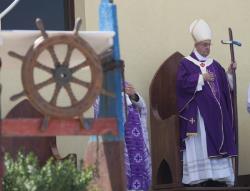To the edge of the universe: the Vatican Observatory welcomes Pope Francis

(Vatican Radio) “We announce with joy that Pope Francis has had lunch with the Jesuit community of the Vatican Observatory. We are deeply moved!” This was the first of a series of messages posted on Twitter on Sunday by Jesuit astronomers of Castel Gandolfo – first in Italian and then in English, Spanish and French. The Vatican Observatory has its headquarters in the Pontifical Villas of Castel Gandolfo, while the Pontifical Palace, directly above the apartment of the Pope, continues to host the domes with telescopes. But the observations for some time have been being made at the new research centre, the Vatican Observatory Research Group (VORG), located in the United States, in Tucson, at the Steward Observatory of the University of Arizona.
Vatican Radio’s Fausta Speranza spoke with the director of the Vatican Observatory, Father José Gabriel Funes (pictured), about Pope Francis’ visit to one of the oldest astronomical research institutions in the world.
Father José Gabriel Funes(JF): It was a very beautiful day for the us Jesuits who work at the Vatican Observatory. We greeted the Pope, then we took him to see some of the places we have here at Castel Gandalfo. The Pope saw some ancient books – the most precious ones we have – such as, for example, a copy of Copernicus’ De revolutionibus, the Principia of Isaac Newton, and La riforma del calendario gregoriano [“The Reform of the Gregorian Calendar”] and the Tabelle [“The Tables”] of Father Clavio, who took part in that reform. He visited the meteorite laboratory, where he looked in the microscope at a meteorite that had fallen at Buenos Aires. Brother Consolmagno, the curator, had prepared this little surprise. At the end of lunch, the Pope signed the parchment we have with the signatures of all the Popes from Pius XI up to today, to Pope Francis. It was truly very beautiful, and we are very happy.
Fr.John Ch’i Shen-chung went to the Lord

Dear Brothers in Christ,
Fr. John Ch’i Shen-chung went peacefully to the Lord on July 16, 2013 at the Infirmary in Taipei at 11:20 p.m.
Fr. Ch’i was born in Qijiazhuang, Xianxian, Hebei, on Feb. 1, 1924. He entered the Society in Xianxian, China, on Aug. 14, 1945, was ordained to the priesthood on Mar. 11, 1958 at Baguio, Philippines, and made the last vows on Feb. 2, 1961 in Manila.
All priests of the Chinese Province will celebrate one Mass first intention for Fr. Ch’i’s eternal rest. Those who are not priests will offer one Mass and Communion and recite one “corona”. The members of the Theologate community will offer two Masses, etc.
Yours in Our Lord,
Luciano Morra, S.J.
Socius
July 17, 2013
“enemies”

Befriend your enemies, and you’ll have destroyed them.
We Are One Body

Brian Nelson spent 12 years of his life staring at four concrete walls. “Day after day, all I saw was gray walls,” he writes of his time in solitary confinement at Tamms Correctional Center in Illinois, “and over time my world became the gray box.” While in solitary, Nelson lost 41 pounds, developed severe psychological problems and prayed for death to end his suffering.
Nelson, who was convicted of robbery and murder at the age of 17, understands that crimes bring consequences. But solitary confinement, he says, is more than punishment-it is torture. It is designed to deny human fellowship and strip away human dignity. A devout Catholic, Nelson describes solitary confinement as “just plain cruel and completely against the Catholic Church.” He explains: “In solitary, you have no creation. You have some air, some water and maybe a bug or two. That’s it.”
Prisoners in solitary confinement spend 22 to 24 hours a day in an 8-foot by 10-foot cell in conditions of extreme isolation and sensory deprivation. Some, like Nelson, languish in these tomb-like cells for years or even decades. And in the United States, the practice is far from rare. Although solitary confinement is often thought of as a last resort for the most dangerous criminals, in fact 80,000 prisoners are held in isolation in state and federal prisons across the country on any given day. Many are placed in solitary confinement for nonviolent infractions like possession of contraband or failure to obey an order promptly.
During his years in isolation, Nelson suffered extreme insomnia, was unable to eat, developed blood blisters from his uncontrollable pacing and grew so depressed that at times he lost the will to live. “Every day…I got down on my knees and prayed that I would die in my sleep,” he writes, “yet God’s will was not mine.”
Nelson did what he could to keep sane. “I fought hard with my own mind, and I prayed,” he says. He copied the entire Bible by hand, read hundreds of books on Catholicism and followed the Trappist tradition of praying seven times a day. But it was a struggle to maintain his religious practice amid the isolation. “As Catholics, we should participate in the communion of saints with each other. We are not supposed to be alone.”
Nelson also faced frequent denials of his religious rights. He was unable to attend Mass and was often denied the chance to receive Communion. He was harassed and placed on suicide watch for fasting or abstaining from meat and sometimes was even denied his Bible, prayer book and rosary. “I did confession at my cell front,” he says. “An officer could hear it. There was a speaker in my cell. They wouldn’t give me privacy. But my soul is more important.”
Catholic Action
The past decade has witnessed an increase in resistance to solitary confinement by human rights and civil liberties groups, mental health advocates, concerned citizens and people of faith, including Catholics.
In 2000 the U.S. Conference of Catholic Bishops released a statement on crime and criminal justice, calling on Catholics to “insist that punishment has a constructive and rehabilitative purpose.” The bishops stated: “We oppose the increasing use of isolation units, especially in the absence of due process, and the monitoring and professional assessment of the effects of such confinement on the mental health of inmates.”
“We’re opposed to the inhumane treatment of other human beings,” explained Bishop Howard J. Hubbard of Albany, N.Y. He said that although individuals face incarceration because of their own actions, “Once they are in such a facility, we would expect them to be treated in a humane way…. If they are not, the entire community should be concerned with this, not only people whose friends and family members are affected.”
Bishop Hubbard was spurred to action in the late 1990s after speaking with prison chaplains who served isolated prisoners. The chaplains were very concerned about the effect this was having on the prisoners’ social and mental well-being. Bishop Hubbard brought the issue before other Albany-area religious leaders, who worked together to lobby for legislative change and to increase media attention on the issue.
He and his fellow New York bishops discussed solitary confinement in a pastoral statement on criminal justice in 2000, asserting: “The human dignity of inmates is compromised by extended confinement in such units. Rather than restoration and rehabilitation, such extended isolation threatens to inflict mental harm on inmates.”
The New York State Catholic Council continues to encourage lawmakers to reconsider the use of prolonged solitary confinement. “In relation to [Special Housing Units], we question the conditions under which they operate, the extent of their use, and the extended length of time of their use,” the group said in a statement. “Our chief concern is loss of human dignity, where punishment overrides concerns for public safety, rehabilitation or restitution.”
The Rev. Richard L. Killmer, a Presbyterian minister and executive director of the National Religious Campaign Against Torture, says the work of Catholic advocates is key to his organization’s mission. The campaign is an interfaith effort, with representatives from more than 300 religious groups, and aims to end U.S.-sponsored torture and the use of prolonged solitary confinement. Reverend Killmer says the Catholic Church is influential in anti-torture work because Catholics tend to be “very concerned with real pain and hurt and brokenness that occurs in the world.”
One of the campaign’s many collaborators is the Oratory Church of St. Boniface, a Catholic parish in Brooklyn, N.Y., that has an active social justice committee. Marion Defeis, C.S.J., one of the committee members, served as a chaplain for 23 years at the Rikers Island jail complex in New York City. There she saw firsthand the effects of solitary confinement. She says, “I felt it was inhumane, it was brutal, it was a terrible way to treat people.” Later, after reading an article distributed by the National Religious Campaign Against Torture that equated solitary confinement with torture, she realized, “I was witnessing torture without calling it that.”
Sister Marion brought her concerns to the social justice committee, which began hosting panels on solitary confinement and inviting experts and former prisoners to speak. After hearing firsthand accounts of solitary, she says, people began to understand that this was torture. Solitary confinement “is directly opposed to the way…we are supposed to treat one another,” says Sister Marian. “We are inflicting pain unnecessarily. If we believe we are children of God, how can we treat our brothers and sisters that way?”
Voices Heard
The social justice committee at St. Boniface helped the campaign collect the 500 signatures needed to present a petition to the New York State legislature. But the parish also collaborates with Pax Christi, the Catholic peace organization, other faith communities and secular groups like the New York Civil Liberties Union. Similar collaborative efforts have sprung up in other states and on a national level.
In June 2012 this growing pool of activists had reason to celebrate. In a historic congressional hearing convened by Senator Richard J. Durbin, Democrat of Illinois, a Senate subcommittee for the first time heard testimony on the effects of solitary confinement. Senator Durbin opened the hearing with a call to his senatorial colleagues to visit a prison. He described his own experience of doing so as “an eye opener.”
Senator Durbin explained that solitary confinement is no longer used only for the most dangerous prisoners, the “worst of the worst,” but for vulnerable groups like immigrants; children; and lesbian, gay, bisexual and transgender inmates. There has been “an alarming increase in isolation for those who don’t really need to be there,” he said.
Brian Nelson submitted written testimony for the hearing on the psychological impact of his time in solitary confinement. He described the lasting effects of such treatment. “I am a human being, and every day I still struggle with the trauma from being held in that gray box,” he said. “I wake screaming at night. I can’t get it out of my head some days. Solitary confinement, in my opinion, is worse than being beaten. That I spent 12 years in such conditions in America is appalling.”
Faith-based organizations showed their support for the hearing by holding a nationwide, 24-hour fast. At the end of the fast, Kathy McNeely, director of the Maryknoll Office for Global Concerns, shared the experiences of Maryknoll priests and sisters who have undergone “great psychological and physical anguish” in solitary confinement around the world. “Catholic social thought is built on the dignity of the human person. And the person is not only sacred but social,” she explained. “According to church teaching all people have a right to and a duty to participate in society, seeking together the common good and well-being of all…. The practice of solitary confinement undermines this right and duty.”
Underlying Issues
Finally released from the “gray box” in 2010, Brian Nelson now works as a paralegal and is a major voice in the growing effort to eliminate prolonged solitary confinement. Along with other advocates, Nelson believes that despite some progress, solitary confinement has yet to take its place as a major domestic human rights concern.
The Rev. Michael Bryant, founder of Welcome Home, a program in Washington, D.C., that helps released individuals reintegrate into society by pairing them with compassionate volunteer mentors, concurs. “It’s not a particularly popular issue to the general public, as you might imagine,” he says. Father Bryant, who once served as a detention center chaplain, explains that criminal justice is unfortunately “generally not a standard bill of fare from the Sunday pulpit,” but this does not have to be the case. In an experiment he conducted for his doctoral thesis, Father Bryant found that when parishioners received just a half-hour overview on criminal justice from a Gospel perspective, their views on prisoners and criminal justice issues changed substantially.
Beyond solitary confinement, Father Bryant identifies many underlying problems in the criminal justice system. “The poor, people of color and low-level drug offenders are overwhelmingly represented in institutions throughout the United States,” he explains, and it is also the case that jails and prisons lack sufficient physical and mental support and skills training for inmates. This contributes to a “societal environment that grooms them for failure.”
Charlie Sullivan, co-director of Citizens United for Rehabilitation of Errants, agrees that the overall prison structure is at the root of the problem. Sullivan accounts for the rise of solitary confinement in terms of carrots and sticks. “Prisons used to use incentives to [encourage prisoners to] follow the rules, like good-time credits,” he explains. But over the years, things changed. “They instilled mandatory minimums, cut education, and paroles became rarely granted.” Because prisoners now have nothing to gain by following the rules, the authorities rely on sticks alone, and they “just keep building the stick bigger and bigger.”
Sullivan believes the practice of solitary confinement will wane when people embrace the full humanity of those in prison. Sullivan and other Catholic advocates are united by the desire to secure humane treatment for this group of people Christ included as “these least brothers of mine” (Mt 25:40). The more than two million Americans in prison are largely invisible to the rest of society, and those in the “gray box” are the most invisible of all. By bearing witness to these forgotten souls, advocates oppose a practice that damages not only those who endure it, but the larger society that allows it to continue.
From Heaven, Three Popes of Vatican II watch over the Young People of the World Gathered in Rio

Blessed John XXIII speaks to young people
On the night of October 11, 1961, at the end of an historic day marking the opening of the Second Vatican Council, an aging and infirm Pope John XXIII appeared at the window of his study in the Apostolic Palace in answer to the request of nearly half a million young people who had gathered in the Piazza below and made a memorable impromptu speech. Known as the ‘Discorso della Luna’ or ‘Moonlight Speech’, it lives on in people’s hearts and minds to this day.
“Dear sons and daughters, I feel your voices! Mine is just one lone voice, but it sums up the voice of the whole world. And here, in fact, all the world is represented here tonight. It could even be said that even the moon hastens close tonight, that from above, it might watch this spectacle that not even St Peter’s Basilica, over its four centuries of history, has ever been able to witness.”
“…My own person counts for nothing – it’s a brother who speaks to you, become a father by the will of our Lord, but all together, fatherhood and brotherhood and God’s grace, give honor to the impressions of this night, which are always our feelings, which now we express before heaven and earth: faith, hope, love, love of God, love of brother, all aided along the way in the Lord’s holy peace for the work of the good. And so, let us continue to love each other, to look out for each other along the way: to welcome whoever comes close to us, and set aside whatever difficulty it might bring.”
“answer”

It’s not like a exam, which every complicated question has an answer. Some things in life just don’t have a solution.
The most humble man in the world

I usually wouldn’t post something like this on the mind blow section but this mans story simply blew my mind and I thought i’d share it with you guys.
Over 12 years ago a humble old man named Dobri Dobrev decided to give up what he had, to do what he believed was right. Although this man lost his hearing in World War 2 he began to walk 10 kilometers from his village to a city named Sofia. At Sofia he would spend his whole day begging for money, & helping out city churches.
However it was only recently discovered that in those 12 years he had been living off the 80 Euros ($104.35 US Dollars) that he gets a month from his retirement and the food that people gave him. Every penny that he collected from the long walks to Sofia was donated towards restorations of decaying Bulgarian monasteries and utility bills for orphans and churches. In fact he is the biggest financial contributor since he donated approximately 20,000 Euros ($26,088 US Dollars). People couldn’t believe a poor 98-year-old man was willing to give up all the money he had collected over the years just to help out the people in need. Dobri Dobrev proves to us that even one person can make a difference it doesn’t matter what your situation is.
Please like or share so more people can know about grandpa Dobri’s inspiring story
Pope Francis prays for victims, families of Canada train derailment

(Vatican Radio) Authorities in the severely damaged Quebec town of Lac-Megantic said some residents could start returning home on Tuesday, after a runaway train derailed and exploded early Saturday, killing up to 50 people. Dozens are still unaccounted for. In a message to the People of Lac-Mégantic, signed by Vatican Secretary of State Cardinal Tarcisio Bertone, Pope Francis offers his sympathy and prayers for the victims, their families and rescue workers.
Below we publish his message to the People of Lac-Mégantic :
“Upon learning of the tragic train derailment at Lac-Mégantic, with its many victims of whom a large number is still unaccounted for, His Holiness Pope Francis unites himself through prayer in the anguish of the grieving families, and he entrusts the victims to the mercy of God, asking Him to welcome them into His light. He expresses his deep sympathy to the injured persons and their families, to the emergency workers, and to all the people around them, asking the Lord to support and comfort them in their hardship. As a token of consolation, the Holy Father sends a special apostolic blessing to all persons touched by this tragedy. “
Pope at Lampedusa:

(Vatican Radio) Pope Francis travelled on Monday to the tiny Sicilian island of Lampedusa. He threw a wreath of flowers into the sea to remember the thousands of migrants who have died making the journey to Italy from Africa. He then met with several migrants, thanking them for their welcome. The highlight of the day was a Mass celebrated in the island’s sports stadium, which served as a reception centre for the thousands of people who fled the upheavals caused by the Arab Spring unrest in North Africa, as well as refugees from poverty and violence in other parts of Africa.
Pope Francis said he came to Lampedusa “today to pray, to make a gesture of closeness, but also to reawaken our consciences so that what happened would not be repeated.”
He began by greeting the islanders with the phrase “O’ scia’!” a word of greeting in their local dialect, and thanking them for the work they have done to provide assistance to the migrants who have found their way to Lampedusa, saying they offer “an example of solidarity.”
He also greeted Muslim migrants who are about to begin Ramadan.
“The Church is near to you in the search for a more dignified life for yourselves and for your families,” he said.
The Holy Father wore violet vestments during the Mass, calling it a “liturgy of repentance.”
“God asks each one of us: Where is the blood of your brother that cries out to me?,” Pope Francis said during his homily, quoting from the Genesis story of Cain and Abel. “Today no one in the world feels responsible for this; we have lost the sense of fraternal responsibility.”
“The culture of well-being, that makes us think of ourselves, that makes us insensitive to the cries of others, that makes us live in soap bubbles, that are beautiful but are nothing, are illusions of futility, of the transient, that brings indifference to others, that brings even the globalization of indifference,” he continued. “In this world of globalization we have fallen into a globalization of indifference. We are accustomed to the suffering of others, it doesn’t concern us, it’s none of our business.”
Pope Francis then moved from the Old Testament to the New Testament, with another story of death caused by indifference to suffering: the Massacre of the Innocents.
“Herod sowed death in order to defend his own well-being, his own soap bubble,” said the Holy Father. “And this continues to repeat itself. Let us ask the Lord to wipe out [whatever attitude] of Herod remains in our hears; let us ask the Lord for the grace to weep over our indifference, to weep over the cruelty in the world, in ourselves, and even in those who anonymously make socio-economic decisions that open the way to tragedies like this.”
Pope Francis then asked for forgiveness: for the “indifference towards so many brothers and sisters…for those who are pleased with themselves, who are closed in on their own well-being in a way that leads to the anaesthesia of the heart, … for those who with their decisions at the global level have created situations that lead to these tragedies. Forgive us, Lord!”
Though the influx of migrants has slowed since its height at the outbreak of the Arab Spring in 2011, people nevertheless continue to come. Shortly before the pope arrived on the tiny island Monday morning, a boat carrying 165 migrants from Mali made port. On Sunday, 120 people including four pregnant women were rescued at sea after their vessel suffered engine failure roughly 11 kilometres from the Lampedusan coast.
Best Ignatian Songs: Laughing With

by Jim Manney
Regina Spektor is an indie pop singer-songwriter and pianist with a serious bent. She’s written several songs on biblical themes. In “Laughing With,” she ventures into theology, contrasting the times when we take God seriously with the times we don’t. It helps to follow the lyrics. This video has them in both English and Spanish.




